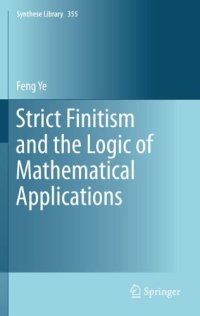
Ebook: Strict Finitism and the Logic of Mathematical Applications
Author: Feng Ye (auth.)
- Tags: Philosophy of Science, Logic, Mathematical Logic and Foundations
- Series: Synthese Library 355
- Year: 2011
- Publisher: Springer Netherlands
- Edition: 1
- Language: English
- pdf
This book intends to show that radical naturalism (or physicalism), nominalism and strict finitism account for the applications of classical mathematics in current scientific theories. The applied mathematical theories developed in the book include the basics of calculus, metric space theory, complex analysis, Lebesgue integration, Hilbert spaces, and semi-Riemann geometry (sufficient for the applications in classical quantum mechanics and general relativity). The fact that so much applied mathematics can be developed within such a weak, strictly finitistic system, is surprising in itself. It also shows that the applications of those classical theories to the finite physical world can be translated into the applications of strict finitism, which demonstrates the applicability of those classical theories without assuming the literal truth of those theories or the reality of infinity.
Both professional researchers and students of philosophy of mathematics will benefit greatly from reading this book.
This book intends to show that radical naturalism (or physicalism), nominalism and strict finitism account for the applications of classical mathematics in current scientific theories. The applied mathematical theories developed in the book include the basics of calculus, metric space theory, complex analysis, Lebesgue integration, Hilbert spaces, and semi-Riemann geometry (sufficient for the applications in classical quantum mechanics and general relativity). The fact that so much applied mathematics can be developed within such a weak, strictly finitistic system, is surprising in itself. It also shows that the applications of those classical theories to the finite physical world can be translated into the applications of strict finitism, which demonstrates the applicability of those classical theories without assuming the literal truth of those theories or the reality of infinity. Both professional researchers and students of philosophy of mathematics will benefit greatly from reading this book.